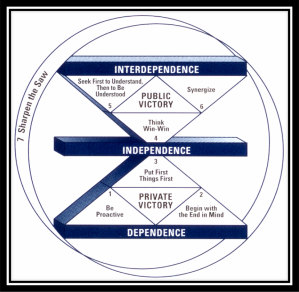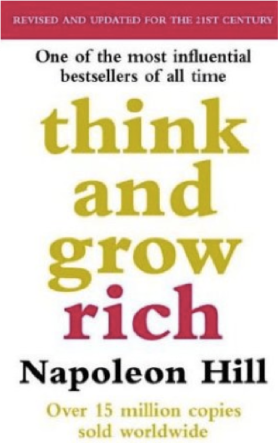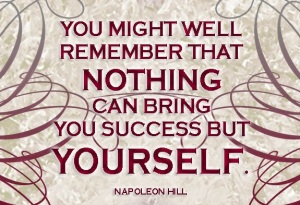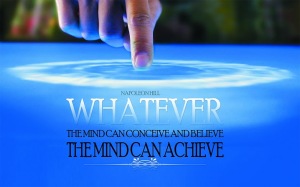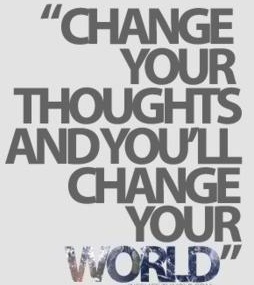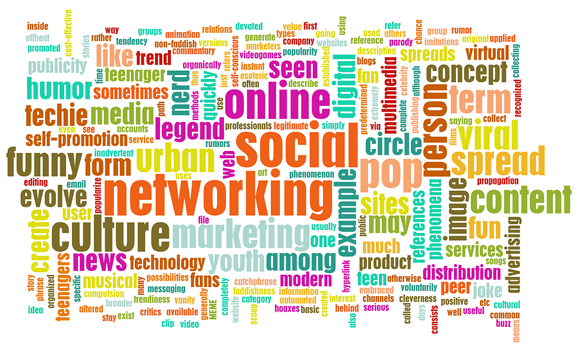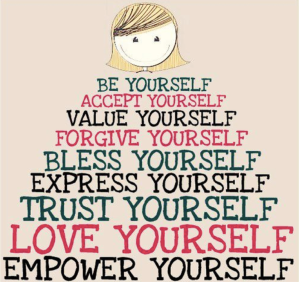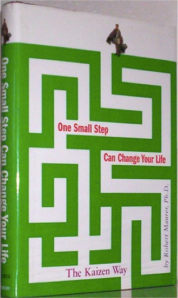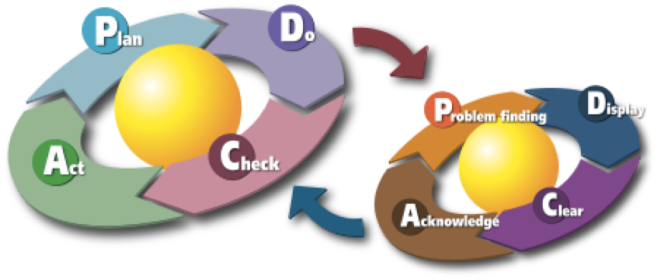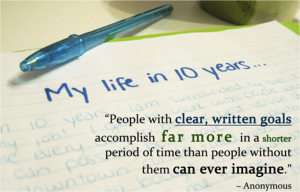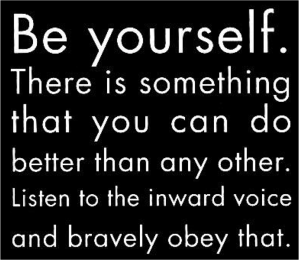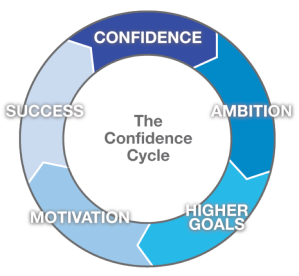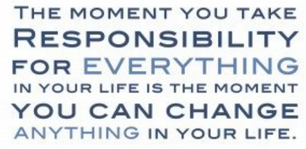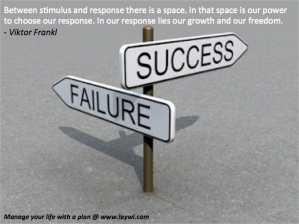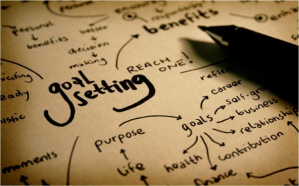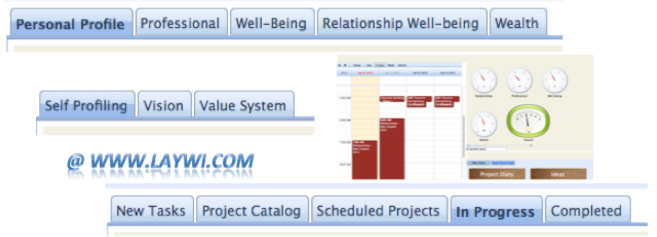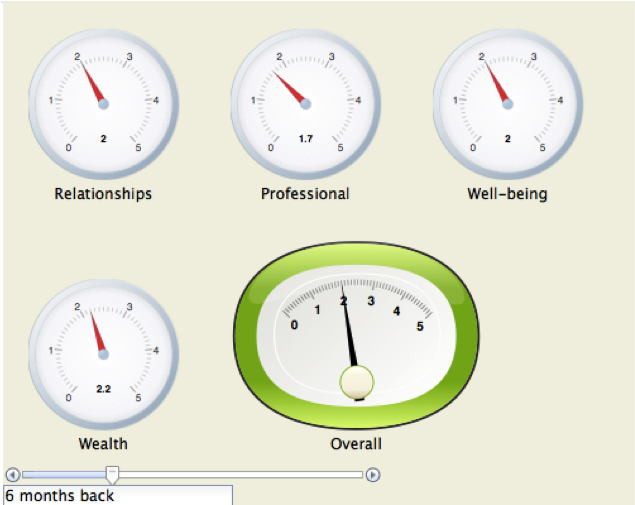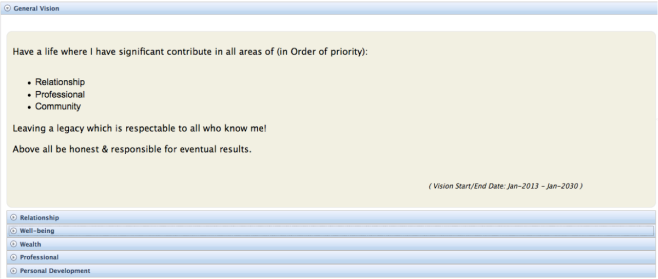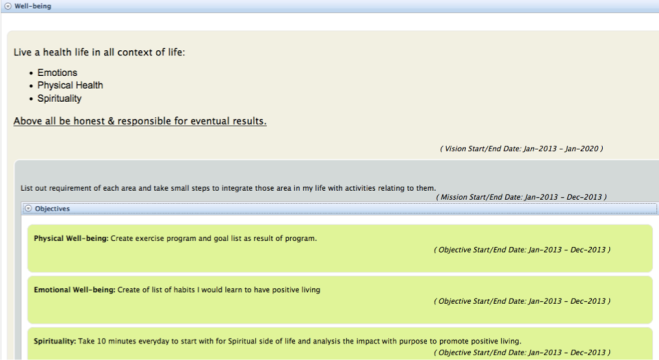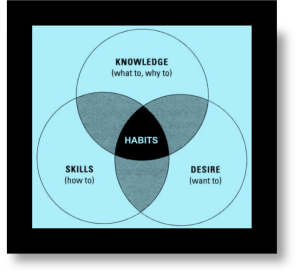 The 7 Habits of Highly Effective People provides a holistic, integrated approach towards personal and interpersonal effectiveness. Habits are patterns of behavior that involve three overlapping components: knowledge, desire, and skill. Because these three components are learned rather than inherited, our habits are our second nature, not our first. Thus, we are not our current habits. We can make or break our habits.
The 7 Habits of Highly Effective People provides a holistic, integrated approach towards personal and interpersonal effectiveness. Habits are patterns of behavior that involve three overlapping components: knowledge, desire, and skill. Because these three components are learned rather than inherited, our habits are our second nature, not our first. Thus, we are not our current habits. We can make or break our habits.
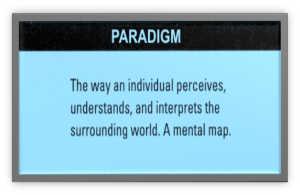
Before we can really understand the 7 Habits of highly effective people, we need to understand our own paradigms and how to make a Paradigm Shift. The word paradigm was originally a scientific term, and is more commonly used today to mean a model, theory, perception, assumption, or frame of reference.
A simple way to understand paradigms is to see them as maps. Assume you wanted to arrive at a specific location in central Chicago. But suppose you were given the wrong map. Through a printing error, the map labeled Chicago was actually a map of Detroit. Can you imagine the frustration and ineffectiveness of trying to reach your destination?
The more we are aware of our basic paradigms, maps, or assumptions, and the extent to which we have been influenced by our experiences, the more we can take responsibility for those paradigms, examine them, test them against reality, change them if necessary, and listen to others and be open to their perceptions, thereby getting a larger picture and a far more objective view.
It becomes obvious that if we want to make relatively minor changes in our lives, we can focus on our attitudes and behaviors. But if we want to make significant quantum changes, we need to work on our basic paradigms – the way we view ourselves and the world around us.
Habit 1 – BE PROACTIVE: 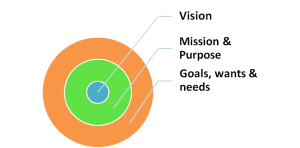
Be Proactive is about taking responsibility for your life. You can’t keep blaming everything on your parents or grandparents. Proactive people recognize that they are “response-able.” They don’t blame genetics, circumstances, conditions, or conditioning for their behavior. They know they choose their behavior. Reactive people, on the other hand, are often affected by their physical environment. They find external sources to blame for their behavior. If the weather is good, they feel good. If it isn’t, it affects their attitude and performance, and they blame the weather. All of these external forces act as stimuli that we respond to. Between the stimulus and the response is your greatest power–you have the freedom to choose your response. one of the most important things you choose is what you say. Your language is a good indicator of how you see yourself. A proactive person uses proactive language–I can, I will, I prefer, etc. A reactive person uses reactive language–I can’t, I have to, if only. Reactive people believe they are not responsible for what they say and do–they have no choice.
I have the ability to choose my own response. I carry my own weather – whether it rains or shines makes no difference to me. By grounding my emotional life not on the moods or weaknesses of others, but upon my self-chosen values, my behavior is a product of my own conscious choices based on principles, rather than a product of my conditions, based on feelings. Focus time and energy on things I can control (circle of influence) in lieu of reacting to or worrying about conditions over which I have little or no control (circle of concern). In so doing, I become RESPONSE-ABLE.
- I am responsible for my choices and have the freedom to choose.
- I am responsible of my behavior and the choices I make.
- I can expand my personal freedom and influence through being response-able.
- Recognize reactive triggers, increase my circle of influence, become a transition person and exercise the four human endowments
Instead of reacting to or worrying about conditions over which they have little or no control, proactive people focus their time and energy on things they can control. The problems, challenges, and opportunities we face fall into two areas–Circle of Concern and Circle of Influence.
Proactive people focus their efforts on their Circle of Influence. They work on the things they can do something about: health, children, problems at work. Reactive people focus their efforts in the Circle of Concern–things over which they have little or no control: the national debt, terrorism, the weather. Gaining an awareness of the areas in which we expend our energies in is a giant step in becoming proactive.
Habit 2 – BEGIN WITH THE END IN MIND: The Habit Of Personal Leadership.
Habit 2 is based on imagination–the ability to envision in your mind what you cannot at present see with your eyes. It is based on the principle that all things are created twice. There is a mental (first) creation, and a physical (second) creation. The physical creation follows the mental, just as a building follows a blueprint. If you don’t make a conscious effort to visualize who you are and what you want in life, then you empower other people and circumstances to shape you and your life by default. It’s about connecting again with your own uniqueness and then defining the personal, moral, and ethical guidelines within which you can most happily express and fulfill it. Begin with the End in Mind means to begin each day, task, or project with a clear vision of your desired direction and destination, and then continue by flexing your proactive muscles to make things happen.
Without VISION, one diminishes. If I fail to develop my own SELF-AWARENESS and become responsible for first creations, I empower other people and circumstances to shape my life by default. Lead a life centered on the principles of QUALITY, patience, authenticity, WONDER, mindfulness, self-knowledge
- Mental creation precedes physical creation.
- I can choose my future and create a vision of it.
- I will create results mentally before beginning any activity.
One of the best ways to incorporate Habit 2 into your life if to develop a Personal Mission Statement. It focuses on what you want to be and do. It is your plan for success. It reaffirms who you are, puts your goals in focus, and moves your ideas into the real world. Your mission statement makes you the leader of your own life. You create your own destiny and secure the future you envision.
Habit 3. PUT FIRST THINGS FIRST: The Habit Of Personal Management.
The key is to schedule my priorities, not to prioritize my schedule. Therefore, do the important things first – because where you are headed is more important than how fast you are going. SAY NO TO THE UNIMPORTANT, Remember that frustration is a function of our expectations, not our realizations. So trade crises for progress by focusing on things that are truly important. When I put first things first, I don’t just do things differently – I do DIFFERENT THINGS.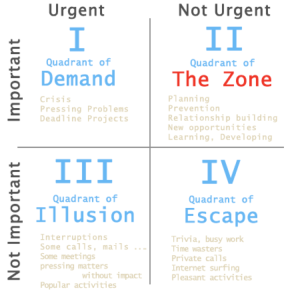
- Effectiveness requires balancing important relationships, roles, and activities.
- Things, which matter most, should never be at the mercy of things, which matter least.
- Focus on Quadrant II and plan weekly; implement daily, based on my mission.
Habit 1 says, “You’re in charge. You’re the creator.” Being proactive is about choice. Habit 2 is the first, or mental, creation. Beginning with the End in Mind is about vision. Habit 3 is the second creation, the physical creation. This habit is where Habits 1 and 2 come together. It happens day in and day out, moment-by-moment. It deals with many of the questions addressed in the field of time management. But that’s not all it’s about. Habit 3 is about life management as well–your purpose, values, roles, and priorities. What are “first things?” First things are those things you, personally, find of most worth. If you put first things first, you are organizing and managing time and events according to the personal priorities you established in Habit 2.
Habit 4. THINK WIN-WIN: The Habit Of Interpersonal Leadership, Relationships start here.
Most of us learn to base our self-worth on comparisons and competition. We think about succeeding in terms of someone else failing–that is, if I win, you lose; or if you win, I lose. Life becomes a zero-sum game. There is only so much pie to go around, and if you get a big piece, there is less for me; it’s not fair, and I’m going to make sure you don’t get anymore. We all play the game, but how much fun is it really?
Win-Win is a belief in the Third Alternative springing from an abundance mentality. It’s not your way or my way; it’s a better way; a higher way. Character is the foundation of win-win, which is comprised of integrity, ABUNDANCE mentality, and maturity. Win- Win is the attitude of seeking either mutual benefit or being able to say no deal. Life is best lived cooperatively, not competitively. Everyone I meet is my mirror, thus it is easier to be caring than hostile. My friends are all around me; I just haven’t met them all yet. Difficult people can be my greatest teachers for what I need most at that moment.
Many people think in terms of either/or: either you’re nice or you’re tough. Win-win requires that you be both. It is a balancing act between courage and consideration. To go for win-win, you not only have to be emphatic but you also have to be confident. You not only have to be considerate and sensitive, you also have to be brave. To do that–to achieve that balance between courage and consideration–is the essence of real maturity and is fundamental to win-win. It is a character-based code for human interaction and collaboration.
Win-win sees life as a cooperative arena, not a competitive one. Win-win is a frame of mind and heart that constantly seeks mutual benefit in all human interactions. Win-win means agreements or solutions are mutually beneficial and satisfying. We both get to eat the pie, and it tastes pretty darn good!
A person or organization that approaches conflicts with a win-win attitude possesses three vital character traits:
1.Integrity: sticking with your true feelings, values, and commitments
2.Maturity: expressing your ideas and feelings with courage and consideration for the ideas and feelings of others
3.Abundance Mentality: believing there is plenty for everyone
Habit 5. SEEK FIRST TO UNDERSTAND, THEN TO BE UNDERSTOOD: The Habit Of Communication, Relationships succeed here.
Communication is the most important skill in life. You spend years learning how to read and write, and years learning how to speak. but what about listening? What training have you had that enables you to listen so you really, deeply understand another human being? Probably none, right?
If you’re like most people, you probably seek first to be understood; you want to get your point across. And in doing so, you may ignore the other person completely, pretend that you’re listening, selectively hear only certain parts of the conversation or attentively focus on only the words being said, but miss the meaning entirely. So why does this happen? Because most people listen with the intent to reply, not to understand. You listen to yourself as you prepare in your mind what you are going to say, the questions you are going to ask, etc. You filter everything you hear through your life experiences, your frame of reference. You check what you hear against your autobiography and see how it measures up. And consequently, you decide prematurely what the other person means before he/she finishes communicating. Do any of the following sound familiar?
To fully, deeply understand another person is to listen with the eyes and the heart, which inspires openness and trust. Empathetic listening within the other’s frame of reference opens me to be influenced. The paradox is that in order to have influence, I must first be influenced. HUMBLE myself by acknowledging that I can be unenthusiastic, impulsive, undisciplined, pessimistic, and an impatient listener. Then strive to transform those same weaknesses into strengths. Always be loyal to the absent – always. Like food, less talk is actually more.
- Diagnosis must precede prescription, and understanding comes through listening.
- Assume I don’t fully understand and by listening first, I’ll be better understood.
- Use empathetic listening… from the other’s frame of reference.
Because you so often listen autobiographically, you tend to respond in one of four ways:
Evaluating: You judge and then either agree or disagree.
Probing: You ask questions from your own frame of reference.
Advising: You give counsel, advice, and solutions to problems.
Interpreting: You analyze others’ motives and behaviors based on your own experiences.
Habit 6. SYNERGIZE: The Habit Of Creative Cooperation/Teamwork. Relationships flourish here.
So put it simply, synergy means, “Two heads are better than one.” Synergize is the habit of creative cooperation. It is teamwork, open-mindedness, and the adventure of finding new solutions to old problems. But it doesn’t just happen on its own. It’s a process, and through that process, people bring all their personal experience and expertise to the table. Together, they can produce far better results that they could individually. Synergy lets us discover jointly things we are much less likely to discover by ourselves. It is the idea that the whole is greater than the sum of the parts. One plus one equals three, or six, or sixty–you name it.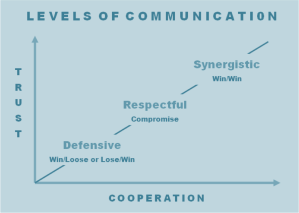
Synergy is the culmination of all the previous habits. Synergy uses differences to build unforeseen strengths. Left to our own experiences, we constantly suffer from insufficient data. Compromise, which seeks only an end, is 1+1=1½, whereas synergy, which seeks a new beginning, makes 1+1=3, 4, or more. This is done by realizing that people see the world not as it is, but as they are [conditioned to see it]. Be sensitive to others’ mental maps (paradigms), which have been constructed to this point in their life with their own experiences.
Use empathetic listening, from the other’s frame of reference.
- The whole is more than the sum of its parts.
- I value the differences in others and seek the Third Alternative (a cooperative solution reached in a win-win spirit that all parties feel good about).
- Working together cooperatively takes time but produces better long-term results.
- Use the synergy ground rules (win-win mentality; open mind; value differences) and apply habits 4
When people begin to interact together genuinely, and they’re open to each other’s influence, they begin to gain new insight. The capability of inventing new approaches is increased exponentially because of differences.
Valuing differences is what really drives synergy. Do you truly value the mental, emotional, and psychological differences among people? Or do you wish everyone would just agree with you so you could all get along? Many people mistake uniformity for unity; sameness for oneness. One word–boring! Differences should be seen as strengths, not weaknesses. They add zest to life.
Habit 7. SHARPEN THE SAW: The Habit Of Self-Renewal.
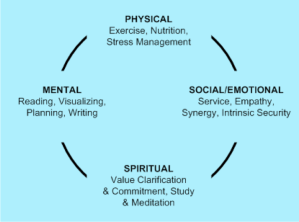
Sharpen the Saw means preserving and enhancing the greatest asset you have–you. It means having a balanced program for self-renewal in the four areas of your life: physical, social/emotional, mental, and spiritual. Here are some examples of activities:
- Physical: Beneficial eating, exercising, and resting
- Social/Emotional: Making social and meaningful connections with others
- Mental: Learning, reading, writing, and teaching
- Spiritual: Spending time in nature, expanding spiritual self through mediation, music, art, prayer, or service
Success has two sides: production capability (PC), and production (P). Without the renewal of PC, P begins to diminish, and eventually perishes. RECOGNIZE my strengths daily, reaching for new ones. REMEMBER what is important in life is learning, health, purpose, conformity to my own uniqueness, temperance, and inner peace. Learning will always return meaning and energy to my effort, so I’m never alone with a great book. Without this renewal, the body becomes weak, the mind mechanical, the emotions raw, the spirit insensitive, and the person selfish. Not a pretty picture, is it?
Production (results) requires the development of Production Capability (resources). I will continuously improve and renew in the four dimensions of life. Set and achieve goals for personal P/PC balance.
